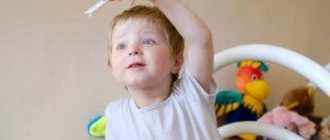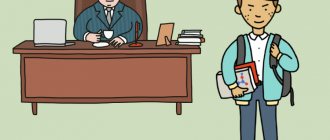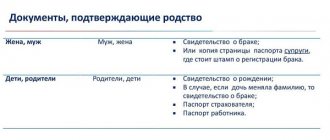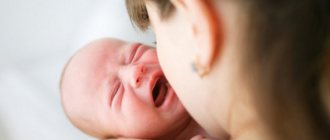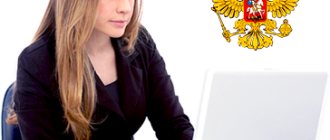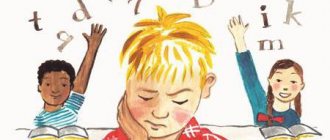Characteristics of the child
Now that you have an idea of what a teacher’s correct characteristics for a child should look like, it is important to understand what algorithm it is based on. We have developed an approximate diagram:
- The very first item you need to indicate is information about the child. These are his initials, date, main place of birth. The child’s place of residence and his registration address are indicated. The language of child upbringing is established, which is used both in kindergarten and at home. It is indicated how long the child attends kindergarten and with what frequency.
- The teacher should describe how much the child enjoys visiting this institution. Here you need to indicate how often classes were missed and what the main reason was. Also, if a child has chronic diseases, due to which he often does not appear in the institution, this should be noted.
- Without fail, the teacher's description of a kindergarten student contains an indication of how the child interacts with other students, including adults, teachers, nannies, and so on. How sociable and independent the child is in principle. The teacher indicates to what extent the child follows the rules of personal hygiene, as well as how independent he is in terms of dressing, falling asleep, and eating.
- They indicate interests in specific activities, for example, games, drawing, music, and so on.
- Without fail, the teacher must clarify how the child feels about work. Can he clean up the toys from start to finish? From the first time he fulfills the teacher’s request. Does he have the motivation to help his older peers?
- The position the baby takes during games is indicated. What roles are most often his favorites, how can he regulate critical situations that arise.
- In the very last point, the teacher takes responsibility for giving the child a psychological characteristics, taking into account the characteristics of his behavior, as well as relationships with parents, educators and peers.
Play activity
The description necessarily includes a very important point - gaming activity, since the child spends most of his time playing games of different types. This describes the child’s inclinations, as well as his interests aimed at this or that pastime.
This is also important to know:
How to write a testimonial for yourself
It is also imperative to take into account the specific type of activity when the child is most enthusiastic and shows himself actively in the gameplay. This also includes creative activities that captivate the child.
Emotional-volitional sphere
These points describe the mood of the child, including a child with mental retardation, which is typical for him in most situations. It also indicates the adequacy of the baby and his reaction to simple external stimuli, for example, a request to put away toys or go to bed.
The child’s purposefulness and strong-willed character are characterized, that is, the teacher makes a conclusion about whether the child can control his activities and actions or not.
There are negative aspects to the character of many children. Among them are theft, deceit, sneaking, and so on. As unpleasant as it may be, the characteristics even indicate such nuances.
Organizational aspects
The document is prepared with the participation of a psychologist, speech therapist and teacher. A ready-made description of a kindergarten student is provided for:
Free legal consultation
We will answer your question in 5 minutes!
Free legal consultation We will answer your question in 5 minutes!
Call: 8 800 511-39-66
Ask a Question
- Admission to school.
- Solutions to legal issues.
- Consultations with a psychiatrist.
- Commissions for transfer to a speech therapy group or specialized educational institution.
- Children with disabilities who attend kindergarten.
- Guardianship and trusteeship authorities.
This is also important to know:
How to write a letter of request correctly
The pedagogical characteristics of a preschool educational institution student is an official document that is invalid without the signature of all persons filling out the form. The seal and signature of the head of the institution is also required.
Characteristics of a kindergarten graduate
In such a document, it is very important to pay attention to motivation for learning and the knowledge gained. It is on the basis of this document that it will be easier for future teachers to navigate the successes of a pupil of a preschool educational institution or a group of a preschool department of a gymnasium.
- Personal data in the form of initials, address and birth information.
- Information about the number of the kindergarten and group.
- Duration of kindergarten attendance.
- Information about the child’s family, the presence of brothers and sisters is indicated.
- The initials of the parents and their places of work are indicated.
- If the family is single-parent, you need to indicate with whom the child mostly lives at the moment.
- If the family is low-income, this should also be noted.
- It is indicated how the child reacted to entering kindergarten.
- The baby's attention is described, as well as the characteristics of memory and thinking.
- The teacher focuses on describing sensory development, speech and analysis of sounds.
- Information about the child's mathematical development is provided.
- Attention is paid to motor skills, how developed they are. Which hand is the dominant one, how much the child can draw, sculpt, and so on.
- The presence or absence of motivation for educational activities is noted.
- The emotional background of the baby is indicated, as well as the psychological characteristics of a particular child.
- In the last paragraph, the teacher must give his recommendations for subsequent teaching in the first grade.
Second version of the characteristics
- General information about the child is indicated, starting with initials and ending with place of residence.
- The family is characterized. Information about parents and their places of work, family composition, and the presence of children in the form of brothers and sisters is indicated here. It is indicated who most often takes part in raising the child, and how much attention he gets from his parents.
- The child's character traits are indicated. Mobility, presence of whims, pathogens, calmness, speed of reaction, and so on are indicated. It also characterizes how cheerful, cheerful and healthy the child is.
- It describes the open or closed style of sociability, how the baby makes contact, and how adequately he reacts to current situations.
- The peculiarity of the child’s behavior in the team is indicated.
- Psychological characteristics are established. For example, the presence of auditory and visual or visual memory, tactile sensation, the presence or absence of long-term memory, working memory, and so on. Particular attention is paid to the stability of attention.
- The level of development of the thought process is indicated. How much a child can qualify the information received, generalize it, and also use it for memorization.
- The possibility of using touch functions is indicated.
- It indicates how much a child can develop his imagination. Here, attention is mainly paid to the richness of imagination, as well as the ability to present various images.
- It is indicated how the child reacts to reading fairy tales and stories, how much he can retell what he has read, and ask questions.
- It is indicated if the child has speech defects, for example, choking, speech stamps, difficulties in pronouncing certain sounds.
- It is indicated how efficient the child is during classes according to a given program. How quickly or slowly he completes the task, is he motivated.
- The performance of the activity is established. Its goal, plan, and how purposeful the child is in general are indicated.
- It is indicated what work was done with the child, whether there was any correction, as well as containment of emotional outbursts.
- How parents influenced the child's ability to learn.
- In conclusion, the teacher makes a conclusion about what approach to apply to the child when he enters first grade.
Pedagogical characteristics for a preschooler in the State Pedagogical Educational Institution
Ivan distinguishes flat geometric shapes. Knows the basic colors of the spectrum and their shades. Not well oriented in space, on a sheet of paper. Does not speak verbal formulations to indicate the spatial properties of objects and the relationships between them. Can count forward and backward within 10. Cannot name seasons, days of the week, parts of the day, months.
Ivan was given previously impaired sounds; in isolation, he pronounces them correctly, but not a single sound is automated. Vocabulary is not age appropriate. The grammatical structure is not sufficiently formed. The child uses simple phrases in dialogue. He can only retell a short literary work with help; it is difficult to compose a coherent story based on a series of plot pictures. Likes to participate in dramatization games, unsure of playing his role. The skills of language analysis and synthesis are not sufficiently developed. The boy does not know all the letters of the Russian alphabet and does not have reading skills
This is interesting: The Judicial Committee Doesn’t File a Case Where It Should Be Addressed
Characteristics of a preschool child sample
Knows and names geometric figures, but cannot classify and transform them. It is difficult to correlate the number of objects with a number. Has knowledge of the sequence of days of the week, current months, seasons. The child’s visual activity is developed satisfactorily. Fine motor skills are at an average level. Olenka loves to draw and paint. The girl does not like to construct buildings from builder, paper and natural materials, because she experiences great difficulties in creating a building, analyzing it, reading diagrams. The child loves to work. She is always ready to help everyone in everything. Prefers household work.
She enjoys playing collective outdoor games with rules. During classes, Olechka is disciplined: she raises her hand, does not interrupt children or adults, and listens carefully to information. The girl is studying according to the preparatory group program. The development of elementary mathematical abilities does not correspond to her age. Olya can count to 10. She has difficulty remembering numbers.
Sample characteristics of a kindergarten pupil to the guardianship authorities
Drawing up a profile for a young child is one of the direct responsibilities of preschool employees. All information that is written in this paper must be detailed and comprehensive. There is a sample document outline that will help educators in their work. The preparation of characteristics is carried out with the obligatory participation of a teacher, speech therapist and psychologist.
It is necessary to describe the child’s positioning in the game, and what roles he likes to try on, how he gets out of critical situations. At the end of the description, the teacher gives his assessment of the psychological portrait of the student, what features of the child’s behavior parents and teachers need to pay attention to.
Characteristics are often perceived by both parents and educators as a nominal document. It is prepared more for show than to provide reliable information. This approach, of course, will be of no use, and the guardianship and trusteeship authorities will most likely require a secondary preparation of the form. How responsibly a teacher approaches his work depends on many aspects, but he will not be able to avoid providing mandatory details.
- Child's name and date of birth.
- Information about mother, father - full name and exact age.
- Information about the presence of brothers and sisters.
- Date of enrollment in kindergarten.
- Frequency of visits and reasons for non-visiting.
- Medical data if the minor has chronic illnesses or disabilities.
You may like => Timing of the Second Wave of Renovation
Psychological and pedagogical characteristics of a child from kindergarten to the guardianship authorities
The main purpose of the characterization of a kindergarten student is to form an idea among the staff of the educational institution about the child’s personality, the pace and conditions of his development. Obtaining such information is necessary to draw up recommendations from department specialists in the following cases:
In conclusion, the author should briefly formulate his opinion about the child. If the baby is healthy and fully developed, and his living conditions do not cause concern, general information is sufficient. If there are deviations, the characteristic should be as detailed as possible.
Sample characteristics for a child sent to the guardianship authorities from a kindergarten
2. Family characteristics: Full name. parents, year of birth, place of work. Family composition: complete, single-parent, large, presence of brothers and sisters. Who is involved in raising the child (mother, father, grandmother, others) Is sufficient attention paid to the upbringing and education of the child?
4. Characteristics of activities: self-care skills: can he independently use toiletries, wash his face, wash his hands, comb his hair, can he dress, undress, put on his shoes independently, can he be shy, tie and untie his shoelaces, use a spoon, fork, can he put his things away and bed.
19 Apr 2021 polrostov 353
Share this post
- Related Posts
- Characteristics from School to Social Rehabilitation Center for Working with the Family of a Pupil
- What to do if My Mother's Rent Arrears are Blamed on Me But I Don't Live There and I'm Not Registered
- Court decision Article 228 Part 5
- Social Transport Card for Pensioners How to Top Up
Characteristics of a child in a preschool educational institution from the teacher
In gaming activities, he shows interest in role-playing games, games with building materials, plays outdoor games with a special desire, understands the rules of the game, follows them, can make changes to the content of the game, is active in group games, and reflects his experience in the game.
KGN. He is independent in self-care, knows his towel, toothbrush, comb, and uses them as intended. He eats independently, not carefully, but holds the spoon correctly. After eating, he cleans up the tableware. Without any reminders, he rinses his mouth and washes his hands, but at the same time he often wets himself and splashes other children. Knows his cubicle and things, does not confuse him with other children's things. He does not always dress himself in the correct order; if he cannot get dressed, he throws his clothes on the floor. Disturbs other children while getting dressed.
The characteristics of a kindergarten student can be written by hand, but it is easier and more convenient if it is drawn up in printed form. This will allow you to easily recognize the text without getting confused in definitions and avoiding discrepancies. The teacher's signature is handwritten.
In conclusion, the author should briefly formulate his opinion about the child. If the baby is healthy and fully developed, and his living conditions do not cause concern, general information is sufficient. If there are deviations, the characteristic should be as detailed as possible.
You may like => Order 308 Harmfulness

